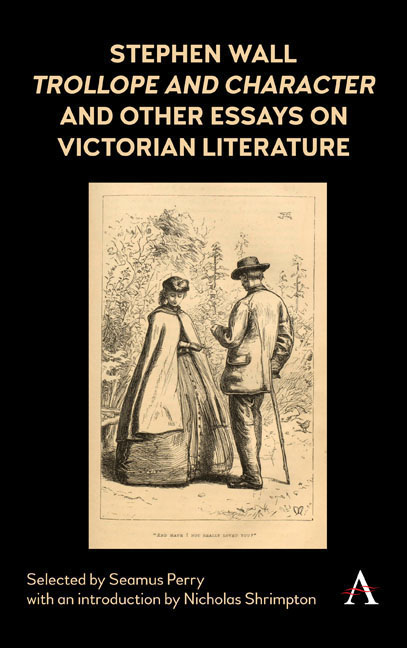Book contents
- Frontmatter
- Contents
- Preface
- Introduction: Stephen Wall and Trollope
- Part 1 On Trollope
- Part 2 On Dickens and Others
- 3 [George Eliot and Her Readers] [1965]
- 4 Jane Austen's Judgments [1968]
- 5 Dickens: New Words and Old Opinions [1969]
- 6 [Dickens and His Readers] [1970]
- 7 Dickens in 1970 [1971]
- 8 Annotated English Novels? [1982]
- 9 Affective Intentions [1985]
- 10 Virtuoso Variations [1987]
- 11 Going Beyond the Repertory [1990]
- 12 A Little Local Irritation [1998]
- Index
3 - [George Eliot and Her Readers] [1965]
from Part 2 - On Dickens and Others
Published online by Cambridge University Press: 25 July 2018
- Frontmatter
- Contents
- Preface
- Introduction: Stephen Wall and Trollope
- Part 1 On Trollope
- Part 2 On Dickens and Others
- 3 [George Eliot and Her Readers] [1965]
- 4 Jane Austen's Judgments [1968]
- 5 Dickens: New Words and Old Opinions [1969]
- 6 [Dickens and His Readers] [1970]
- 7 Dickens in 1970 [1971]
- 8 Annotated English Novels? [1982]
- 9 Affective Intentions [1985]
- 10 Virtuoso Variations [1987]
- 11 Going Beyond the Repertory [1990]
- 12 A Little Local Irritation [1998]
- Index
Summary
The common assumption that there was no intelligent discussion of nineteenth- century English fiction before Henry James has recently begun to break down, and this collection of early reviews of George Eliot's novels will hasten the collapse of this complacent prejudice. It is true that Podsnappery, with its insistence on a novel never bringing a blush to the cheek of the young person, makes some showing in Lerner's and Holstrom's extracts: the Reverend J. C. Robertson is found lamenting, in 1860, that ‘the idea that fiction should contain something to soothe, to elevate or to purify seems to be extinct’. But it is also made extremely clear that, although much mid- Victorian reviewing was largely narrative and descriptive, and by modern standards very leisurely (one notice of Middlemarch ran to 12,000 words), the best of it was also remarkably acute.
George Eliot's artistic stature was immediately recognized. Adam Bede provoked favourable comparison with Thackeray, The Mill on the Floss with Jane Eyre. By 1866, The Times was ready to declare: ‘Hitherto Miss Austen has had the honour of first place among our lady novelists, but a greater than she has now arisen’. George Eliot's understanding of human nature was even put beside Shakespeare's. By the time the later novels appeared, the novelist's classic status was invariably conceded as beyond question, though this did not prevent one reviewer of Middlemarch from forcefully expressing his sense of its sharp modernity.
The best of these early critics not only praised George Eliot for her realism and her moral strenuousness in the sort of terms we should expect: they also anticipate some of the finer distinctions and reservations made in recent criticism. Although most discussion is about character and plot, two reviewers quoted here comment on the symbolism (one actually using the word) of the river in The Mill on the Floss, while another prepares the way for F. R. Leavis's strictures on the presentation of Maggie Tulliver by referring to her ‘picturesque piteousness’. The Saturday Review's 1872 piece on Middlemarch includes a lethal paragraph on the unsatisfactoriness of Will Ladislaw to which little since has been added. Many of its first readers felt oppressed by the pessimistic tone of Middlemarch, and one was sharp enough to see that ‘her melancholy scepticism is too apt to degenerate into scorn’ – a surely valid point that modern critics have too often brushed aside.
- Type
- Chapter
- Information
- Publisher: Anthem PressPrint publication year: 2018



